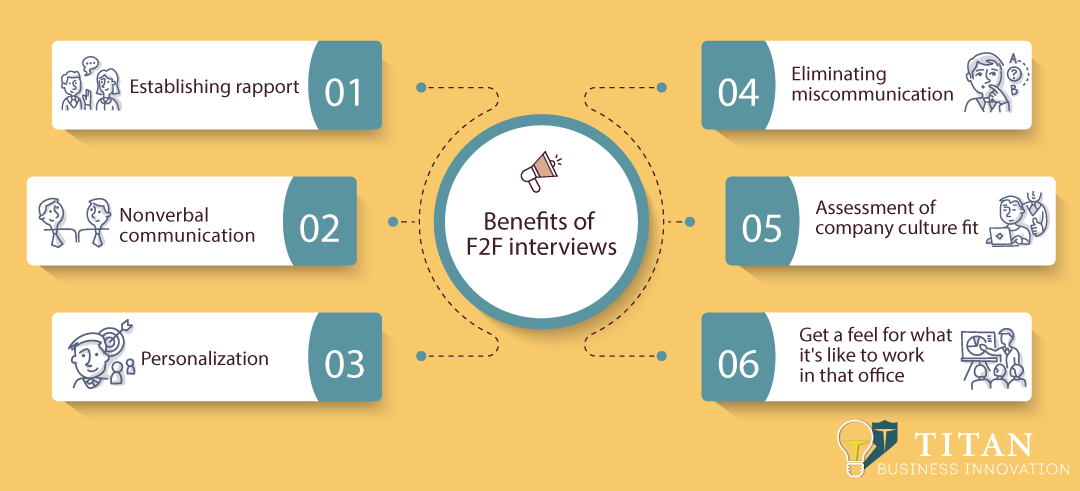As the worst of the Covid pandemic fades away, many companies continue to rely solely on virtual interviews instead of face-to-face (F2F) interviews. However, this approach can make job opportunities seem like items in a shop, and companies risk losing the opportunity to personally engage with candidates and make a strong impression. To attract the best talent, we need to bring back the human touch.
Why is this important?
In the war for top talent, every advantage counts. The ability to establish a personal connection with candidates and build rapport through F2F interviews can be the difference between bringing in a business-changing talent to your company or having them compete against you.

Benefits of F2F interviews:
- Establishing rapport
F2F interviews allow interviewers to establish a connection with candidates and build rapport. This connection is essential for creating a positive and comfortable environment that encourages candidates to open up and share their thoughts and experiences. As a result, the candidate and hirer can better understand each other through more open dialogue, which can lead to a mutually beneficial relationship. - Nonverbal communication
During in-person interviews, interviewers can observe candidates’ body language and facial expressions, revealing their confidence level, enthusiasm, and overall demeanor. This information can be crucial in making hiring decisions. Online interviews can place too much importance on quantitative data, such as the candidate’s work history and skills, and ignore qualitative data, such as emotional intelligence and motivation, which are crucial for productive staff in many roles. - Personalization
In-person interviews provide a personalized experience that shows candidates that the company values them as individuals. This can excite them about the prospect of working for the company and increase their commitment to the interview process. Candidates are increasingly searching for a good cultural fit rather than the highest salary available. Demonstrating the company’s fit for the candidate can help secure the best talent. - Eliminating miscommunication
In-person interviews allow interviewers to clarify questions and ensure that candidates understand the interview questions fully. This eliminates miscommunication and ensures that both parties understand each other. Miscommunication can add time to the process and increase the risk of the candidate taking a job elsewhere. Establishing a solid relationship early in the interview process can help build trust and encourage open communication. - Assessment of company culture fit
In-person interviews allow candidates to observe the company’s culture and work environment. It also enables interviewers to assess whether a candidate would fit well into the company’s culture. Candidates are likely to feel a closer attachment to people they have met and can better judge whether they share similar values. - Get a feel for what it’s like to work in that office
Having an in-person interview also allows the candidate to get a feel for the culture and work environment, which cannot be replicated through a virtual interview. Candidates can observe the hustle and bustle of the company, and this experience can help them make a more informed decision about whether the company is a good fit for them.

What is the best mix of interview styles?
A recent study published in the International Journal of Selection and Assessment has found that using a combination of both online and face-to-face interviews is more effective in predicting job performance than using either interview style alone. The study also suggests that online interviews are useful in initial screening, while face-to-face interviews are better for evaluating interpersonal skills.
Determining the optimal mix of online and face-to-face interviews will depend on several factors such as the industry, position requirements, company hiring goals, and available resources. In general, utilizing a combination of both interview styles can be advantageous. However, certain situations may require a preference for one type of interview over the other.
F2F interviews are recommended for positions that require strong interpersonal skills or for senior-level positions. These interviews allow the interviewer to evaluate nonverbal cues and establish a personal connection with the candidate. They are also beneficial for critical positions that require frequent interaction with colleagues, customers, or stakeholders.
Online interviews may be suitable for positions that require technical skills or remote work since they allow candidates to showcase their proficiency with technology and remote communication tools. Additionally, online interviews can be more efficient for screening candidates when time and resources are limited.
Overall, the ideal mix of interview styles will vary depending on the specific requirements of the hiring team and the position being filled. Employing both online and face-to-face interviews can provide a comprehensive evaluation of candidates and ensure that the most qualified candidate is selected for the job. In situations where face-to-face interviews are not possible, HR can offer candidates a virtual tour of the office at the end of the process to give them a sense of belonging to the company, which is known as “assume the sell.”

